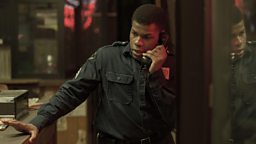Main content
Detroit - This Week At The Movies

Detroit 猸愶笍 猸愶笍 猸愶笍 猸愶笍
In the summer of 1967, riots break out in Detroit. Two days into the unrest, the sound of gunshots sees the local police storm an annex of the Algiers Motel. Three white cops, lead by Philip Krauss (), interrogate the guests to get a confession, brutally beating their black suspects. By the end of the night, three unarmed men were shot dead.
Pros:
- Director Kathyrn Bigelow, veteran of The Hurt Locker, Zero Dark Thirty and the original Point Break, superbly captures the tension and terror felt in the Algiers Motel that night, keeping the connections between the many characters clear while refusing to give the audience a break as the situation gets worse and worse. This is gritty, weighty, punch-to-the-gut cinema that will leave your head spinning, angry, moved and astonished.
- The performances here are outstanding, with Will Poulter – still best known for his work on The Maze Runner, Son Of Rambow and We're The Millers – the stand-out as the unhinged corrupt cop behind the terrible incident. , as private security guard Melvin Dismukes (one of the witnesses of the event), also deserves praise.
- This movie has such a contemporary relevance, particularly in America, that its message lands with a thump. It’s a tough watch, but one will be talked about for years to come, discussing as it does a very important chapter in the US’s history that is often overlooked.
Cons:
- At times, the film rings untrue. It can be unflinching unsubtle, with certain characters lacking nuance to the extent that you can’t quite believe that they’d really do what they are seen to be doing. Jack Reynor’s dim bulb cop is a good example of this, behaving in a way that is frankly unbelievable – and yet, with the film hammering ever onwards with yet more shocking events, you’re willing to overlook it in the moment and perhaps only think about it again long afterwards.
- Similarly, the film can feel cold. It’s brutal, blunt, a shake-you-by-the-shoulders movie that forces your eyes up close to the torture, so in addition to the nuance mentioned above, it also needs more warmth, more to get the audience emotionally connected with that’s happening in front of them.
- In telling the story of an incident where there is no clear, established through-line of what actually happened, the postscript that mentions just this fact can leave viewers thinking… how much of what I just watched really took place? What should I believe? This wouldn’t be as damaging if the pacing and narrative structure was more on point throughout the whole piece, but there’s a sense that Bigelow is tackling a situation so huge that just one film can only scratch the surface of it all.
Three word review: Brutal, important, shocking.

"I just want to be part of the whole buffet" - John Boyega on his love of acting on the big screen
Speak with an American accent for a month? No problem!
-
![]()
Join Radio 1鈥檚 resident film buff Ali Plumb as he reviews the latest movies hitting screens and interviews Hollywood鈥檚 hottest stars.
-
![]()
From Top Gun to his latest American Made, Tom Cruise tells the stories behind his movies.
-
![]()
Radio 1's resident film critic runs through his favourite films of the year!





























